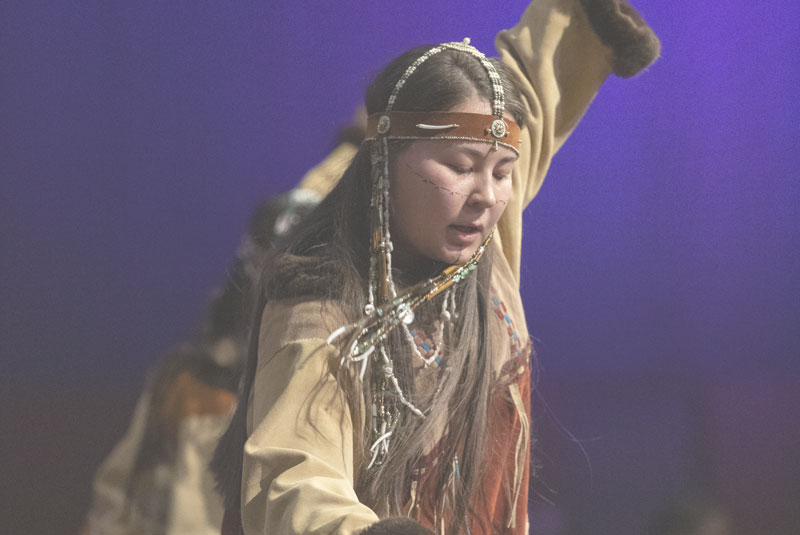Anthropology B.A. or B.S.
Explore the anthropology bachelor’s degree program at the 99�þþ�Ʒ
With a focus on the southern half of Alaska, including the Aleutians, 99�þþ�Ʒ’s anthropology
undergraduate degree program provides unique perspectives on the human experience,
including history, culture and language.
Anthropology scholarships and financial aid
You may qualify for program scholarships such as the Kibrik & Bergelson Student Scholarship,
the Kibrik & Bergelson Study or Research in Russia Scholarship or the Michael Baring-Gould
Scholarship. You may also qualify for general university scholarships or awards from private funders, such as the Alaska Anthropological Association.
Various class locations
You can take 99�þþ�Ʒ anthropology classes on campus in Anchorage or at Kenai Peninsula
College. Some online classes are also available, providing more flexible options for
earning your bachelor’s degree in anthropology.
Academic advising
Stay focused on earning your undergraduate degree with help from the College of Arts
and Sciences’ academic advisor, who will work with you to develop a plan, transfer
credits and answer questions to ensure you fulfill degree program requirements and
graduate on time.
Advanced facilities and workspaces
In addition to 99�þþ�Ʒ’s libraries, computer labs and cultural centers, you will have
access to these dedicated labs in the anthropology department:
- Archaeology Wet and Dry Labs
- The Bioanthropology Lab
- The Cultural Resource Management Lab, with a zooarchaeological comparative faunal collection
- The GIS and Cultural Research Lab, with a computer lab and interview space
- The Anthropology Laboratory for Cultural and Environmental Scanning, with the 3-D modeling lab
Anthropology Club
Open to anyone, the Anthropology Club at the 99�þþ�Ʒ hosts guest speakers on topics in the field
as well as a variety of student activities and events, from movie nights to Archaeology
Day.
Did you know..
Jobs for anthropology majors are growing! According to the U.S Bureau of Labor Statistics, anthropology and archaeology jobs are projected to increase 9 percent in Alaska and 19 percent in the U.S.
What can you do with an anthropology degree from 99�þþ�Ʒ?
Future possibilities for anthropology majors vary widely. Attend graduate school at
the 99�þþ�Ʒ or in the Lower 48, or join the growing workforce
in an anthropology-related field.
Anthropology graduate programs
If you’re interested in working in one of the four sub-fields of anthropology — sociocultural
anthropology, biological anthropology, archaeology and anthropological linguistics
— you may be interested in the 99�þþ�Ʒ’s Master of Arts in
Anthropology degree program.
Anthropology careers
Build your future in archaeology, bioanthropology and cultural anthropology while
working with federal or state government agencies, Alaska Native corporations, museums
or private businesses. With a bachelor’s degree in anthropology, you may qualify for
a variety of jobs such as:
- Tribal liaison
- Subsistence studies researcher
- Environmental impact studies manager
- Cultural resource compliance director
- Linguistic revitalization program coordinator
By the numbers..
Anthropology bachelor’s degree program highlights
Extensive resources and experiences in the classroom and the field facilitate the anthropology department’s focus on applied learning.
- Study and work alongside diverse faculty with wide-ranging expertise and interests. Their specialties are especially related to the surrounding polar, coastal and rural regions, including archaeological excavations, applied medicine, Alaska Native studies, language use and identity, cultural resource management, biological anthropology, applied sociocultural and policy research, behavioral health, historical and industrial archaeology, gender relations and medieval Scandinavia.
- Conduct applied research as an undergraduate student working on faculty projects or independent studies. In the past, anthropology majors have documented archaeological collections, interviewed people, excavated human remains, mapped buildings, drawn archaeological sites and more.
- Graduate with honors. Fulfill GPA and Honors College requirements and complete a senior thesis project with lab, field or library research to qualify.
- Work with anthropology professionals in a practicum on campus or an internship in the community. You can earn course credit while gaining practical experience with federal and state agencies, Alaska Native corporations, private contractors, local service providers and professionals in anthropology-related fields.
Anthropology bachelor’s degree program curriculum
Build a foundation of knowledge and skills by exploring courses in the four subfields
of anthropology: sociocultural anthropology, biological anthropology, archaeology
and anthropological linguistics. Then choose from a range of courses in ethnographic,
topical or theoretical areas.
What’s the difference between the Bachelor of Arts and Bachelor of Science degree
programs in anthropology?
All anthropology majors take either Probability and Statistics or Applied Statistics
for the Sciences. The BA degree program also offers the option of taking Elementary
Statistics.
Top classes for anthropology majors
- Forensic Anthropology
- Explore indigenous research methods in Alaska Native Studies’ cross-cultural Decolonizing Methodologies course
- Arctic and Subarctic Peoples















